June 1, 2016 – The legal profession must innovate – or die, says Milwaukee attorney David Simon, a 2015 Wisconsin Legal Innovator. “The profession is changing in fundamental ways. If we don’t figure out ways to provide more for less, someone else will.”
“While some in the legal community look at the changing legal marketplace as a looming crisis, others see an environment ripe for new ways of providing legal services,” says Tom Watson, who chairs the Communications Committee’s Innovation Subcommittee.
Through the “That’s a Fine Idea: Legal Innovation Wisconsin” initiative, the State Bar of Wisconsin is asking the legal community to help it tell the story of legal innovation. “Tell us about the people and ideas that are changing Wisconsin’s legal landscape,” says Watson.
Innovation can come in many forms, says Watson. It could mean:
- New ways to use technology to improve client service or serve a new market
- Best practices for promoting workplace diversity
- New marketing/business development strategies
- New ways of providing pro bono or reduced-cost services
- Changes in internal operations that result in greater efficiency
Nominate a 2016 Wisconsin Legal Innovator who breaks with tradition to do it better. Nominations close on June 30.
Don’t Worry About the Push Back
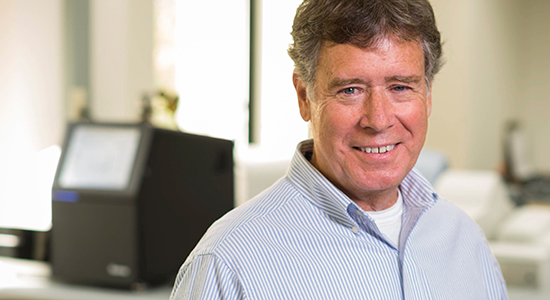
Norman Gahn: A Pioneer in courtroom use of DNA evidence. Photo: Andy Manis
“Think very carefully about the main population that you serve, critically re-examine the effectiveness of present methods or techniques used to serve that population, and then add a new dimension to enhance that service,” advises Milwaukee attorney Norman Gahn. “Go with your instincts and remain confident because you are acting in good faith. And, most important, don't worry about the push back that will come as a result of creative thinking.”
Gahn issued Milwaukee County’s first John Doe DNA arrest warrant in a sexual assault to keep the case open after the statute of limitation expired. His pioneering work in courtroom use of DNA evidence earned him national recognition – and the State Bar of Wisconsin’s first-ever Lifetime Legal Innovator Award last year.
“This award had a significant personal impact on me,” says Gahn. “It was a great honor to have the John Doe DNA warrant accepted by Wisconsin courts and prosecutors nationwide. But, it was most gratifying to know the State Bar of Wisconsin was watching. The Lifetime Legal Innovator Award validated my dedication to serving victims of sexual assault, told me that my peers believed that I upheld the dignity of the profession. That was fulfilling.”
“One of the goals of a prestigious award like this is to inspire other creative legal thinking. It shows that new ideas and action can lead to significant change.”
Ask Clients What They Want; Listen
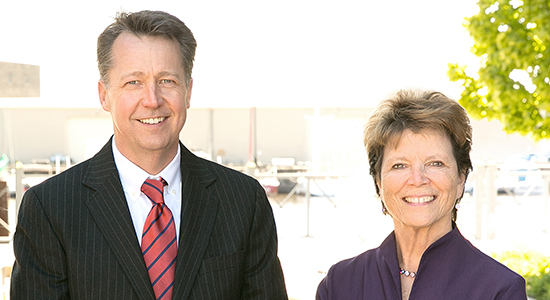
Greg Hildebrand and Susan Hansen: In search of a lower-conflict, lower-cost, healthier divorce.
Be willing to look at your services through the client’s lens, advises Milwaukee attorney Susan Hansen of the Family Mediation Center. “Ask clients what they want. Listen, and reflect on how you can help them solve their problems – the way they want them solved.”
“The old model of service delivery is simply not sustainable,” says Greg Hildebrand, also of the Family Mediation Center. “There is often an arrogance by lawyers that is off-putting to modern consumer perspectives and expectations. The internet has really changed the mode of research, process/transactions, and information – all historic parts of the practice – and most consumers don’t need that anymore. People are looking for creativity and problem-solving. Lawyers need to look at how they can best accomplish that within their practice area.
Hildebrand and Hansen created the Family Mediation Center to help divorcing couples who want a lower-conflict, lower-cost, healthier process for separation and divorce. After an initial meeting with a neutral lawyer mediator who explains the legal steps, various divorce process options, and the legal issues to be resolved, clients may seek additional, individualized mediation help from a group of independent contractors.
“Validating and energizing,” says Hansen about her recognition as a 2015 Legal Innovator. “It invigorated me as an agent for positive change. The award supports our efforts to change the culture of family law for clients looking for a lower-conflict, lower-cost, healthier process for separation and divorce.”
Know a Wisconsin Legal Innovator? Are You One?
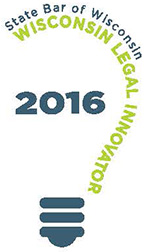
Through the “That’s a Fine Idea: Legal Innovation Wisconsin” initiative, the State Bar of Wisconsin is asking the legal community to help it tell the story of legal innovation.
Tell us about the people and ideas that are changing Wisconsin’s legal landscape. Nominate a Wisconsin Legal Innovator who breaks with tradition to do it better. The Wisconsin Lawyer will feature the people behind the best examples of legal innovation in the November 2016 issue.
Learn more or find the nomination form at ThatsaFineIdea.com. The deadline for nominations is June 30, 2016.
Read more about our 2015 and 2014 Wisconsin Legal Innovators.
Nominate a 2016 Wisconsin Legal Innovator.
Invest in Change
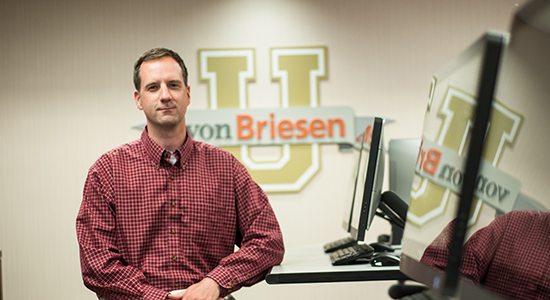
Bill Caraher: An InGenious idea for law firm training. Photo: Mark Hines
“Innovation comes in many ways and is not always measured by a financial investment or a financial gain,” says Bill Caraher, chief information officer at Milwaukee’s von Briesen & Roper S.C. “Fostering a culture of innovation and being open to change will help the best ideas spring forward.”
Caraher had an ingenious idea for law firm training. “Firms struggle to get attorneys to sit in a class. They don’t have that hour or half-hour, but they can take a few minutes to grab a cup of coffee, get in, and get out.”
He modeled the InGenious Bar after the Apple Store, a bright, colorful space where attorneys and staff can drop in on Fridays for a five-minute, one-on-one training session. “People keep coming back,” Caraher says. “That’s a testament to the fact they are getting value out of it.”
What concrete steps should law firms take to think differently about how they deliver legal services? “Invest time in change,” says Caraher. “Too often the demands of the day and client needs take attorneys away from process improvement. Historically, efficiency has not been rewarded in a law firm; fewer billable hours result in lower overall revenue.”
Today’s consumer of legal services has changed and has many more options, he notes. “Efficiency will result in more clients, more matters, and greater trust in your services.”
Innovation Requires Buy-in
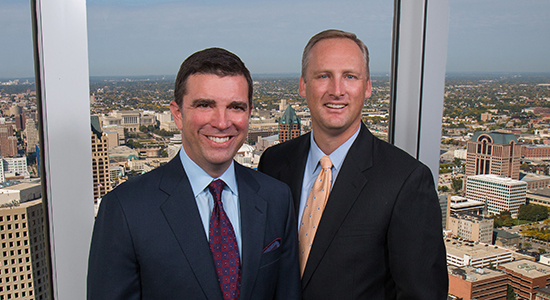
David Simon (left) and John Turlais: Business problem solvers. Photo: Scott Patrick
“The greatest impediment for many law firms, I believe, is committing to the idea of innovation,” says John Turlais of Foley & Lardner LLP, Milwaukee. “Innovation requires buy-in and continuous support from firm leaders, which can be a challenge given that innovative ideas often take time and resources to develop.”
“Don’t assume that the way we’ve done it in the past is the best way to do it today,” advises David Simon. “Start from scratch. Process map how you provide a service and look for inefficiencies and redundancies. Critically assess the skill set needed to perform each task. And really think about how technology can help solve problems – especially routine tasks that don’t require lawyer creativity or judgment.”
Turlais and Simon devised a new tool to help U.S. companies comply with the Foreign Corrupt Practices Act when doing business abroad. The tool, Foley Global Risk Solutions, helps clients implement the legal advice dispensed to help them follow the law.
Innovation gets you a foot in the door, says Turlais. “Businesses are looking for innovative ways to resolve their problems more effectively and efficiently. If you develop a creative solution to a problem, these companies are extremely willing to listen. And, getting that opportunity to speak with busy executives is often half the battle.”
“Receiving last year’s Legal Innovator Award provided a unique way for us to convey to Wisconsin companies with international operations that they have options for addressing corruption risk beyond the billable hour,” observes Turlais.
“Don’t assume that the way we’ve done it in the past is the best way to do it today,” advises David Simon.
The Value of an Innovator Award
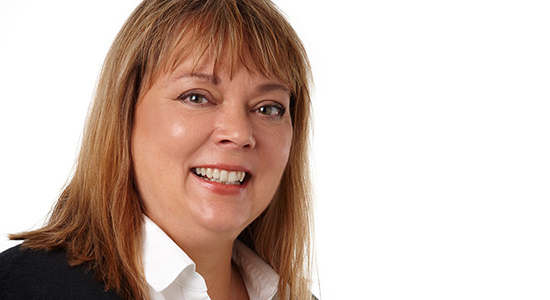
Diane Rondini-Harness: Putting an end to the school-to-prison pipeline.
Each of last year’s legal innovators tell their own story about how the Wisconsin Legal Innovator Award has affected them personally or professionally.
Diane Rondini-Harness of the State Public Defender’s Office says that the award gives projects, like the SPD’s Student Expulsion and Prevention Project (StEPP), the exposure and attention they need for financial or other support.
Rondini-Harness and her colleagues were inspired to do something to curb the impact school expulsions or suspensions has on the “school-to-prison pipeline.” “Students typically have no legal representation at expulsion hearings,” says Rondini-Harness. “And, expulsions or suspensions often start a journey to nowhere.”
With the help of a State Bar Pro Bono Initiative Grant, StEPP teaches volunteer attorneys on the nuts and bolts of expulsions, adolescent brain development, child interview techniques, and cultural awareness.
The Legal Innovator recognition enhanced the program’s credibility, says Rondini-Harness, resulting in increased interest from lawyer-volunteers and the impetus for seeking additional grants and foundation opportunities.
